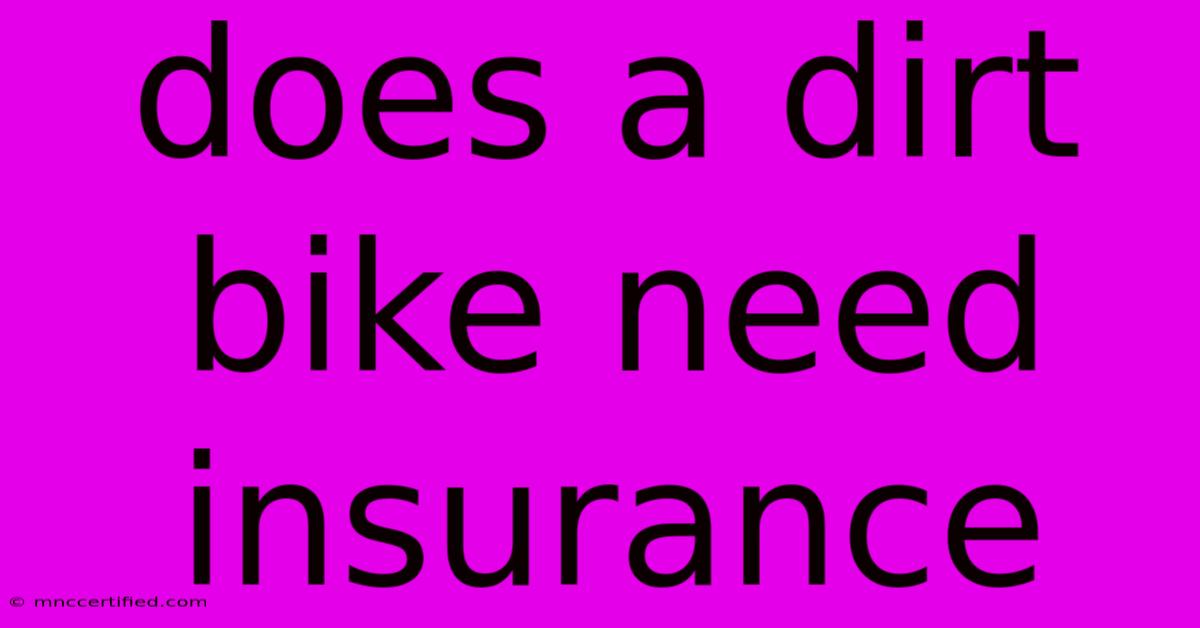Does A Dirt Bike Need Insurance

Table of Contents
Does a Dirt Bike Need Insurance? A Comprehensive Guide
So, you're revving up your engine, ready to hit the trails on your dirt bike. But before you do, a crucial question arises: does a dirt bike need insurance? The short answer is: it depends. There's no single, universal answer, as the need for insurance hinges on several factors. This comprehensive guide will break down everything you need to know to make an informed decision.
Legal Requirements: State-Specific Laws
The most significant factor determining whether you need insurance is your location. Laws regarding dirt bike insurance vary drastically from state to state. Some states might not mandate insurance for off-road vehicles used solely on private property. However, the moment you venture onto public land, or even transport your bike on public roads, the legal landscape changes dramatically.
Key Considerations:
- Public vs. Private Land: Riding on private land typically eliminates mandatory insurance requirements. However, it's crucial to get permission from the landowner before riding.
- Road Use: If you plan on using your dirt bike on public roads – even for transportation to and from off-road areas – you'll likely need insurance, just like you would for any other motor vehicle. This usually involves registering your bike and obtaining a license plate. Failure to do so can result in hefty fines and legal consequences.
- State DMV Regulations: Check with your state's Department of Motor Vehicles (DMV) for specific regulations. Their website is your best resource for accurate and up-to-date information on licensing, registration, and insurance requirements for dirt bikes in your area.
Types of Dirt Bike Insurance
Even if not legally required, insurance offers critical protection. Understanding the different types of coverage available is crucial:
- Liability Insurance: This covers damages or injuries you cause to others while operating your dirt bike. This is the most common and often legally required type of insurance when operating on public roads or certain designated areas. It protects you from potentially devastating financial consequences of accidents.
- Collision Coverage: This protects your dirt bike in case of an accident, regardless of who is at fault. It covers damage to your bike from collisions, rollovers, or other incidents.
- Comprehensive Coverage: This broader policy covers a wider range of incidents, including theft, vandalism, and damage from natural disasters.
Financial Implications: Weighing the Costs and Benefits
While insurance adds to the overall cost of owning a dirt bike, the potential financial implications of not having insurance can be far greater. Consider these scenarios:
- Accident Causing Injury: A single accident resulting in serious injury to another person could lead to lawsuits costing hundreds of thousands, or even millions, of dollars. Liability insurance would cover these costs.
- Bike Damage: Even a minor crash can lead to significant repair bills. Collision coverage can mitigate these expenses.
- Theft or Vandalism: Dirt bikes are attractive targets for theft. Comprehensive insurance can replace or repair your bike if it's stolen or damaged.
Protecting Yourself and Others: Beyond the Legal Requirements
Even if your state doesn't mandate dirt bike insurance for off-road use on private property, consider the ethical and practical implications. Insurance provides a safety net, protecting you and others from the financial fallout of accidents. It demonstrates responsibility and reduces the risk of significant personal financial loss.
Off-Page SEO Strategies for Enhanced Ranking
To improve the search engine ranking of this article, several off-page SEO strategies should be employed:
- Backlink Building: Reach out to relevant websites and blogs in the powersports or motorcycle niche and request links to this article.
- Social Media Promotion: Share the article on relevant social media platforms, encouraging discussion and engagement.
- Community Engagement: Participate in online forums and communities related to dirt bikes and answer questions about insurance.
By understanding the legal requirements in your state, the types of coverage available, and the financial implications, you can make an informed decision about whether dirt bike insurance is right for you. Remember, safety and responsible riding should always be your top priorities.

Thank you for visiting our website wich cover about Does A Dirt Bike Need Insurance. We hope the information provided has been useful to you. Feel free to contact us if you have any questions or need further assistance. See you next time and dont miss to bookmark.
Featured Posts
-
Live Leicester Vs Chelsea Premier League Score
Nov 23, 2024
-
Is Emsella Covered By Insurance
Nov 23, 2024
-
Cher Slams Mask Director Her Review
Nov 23, 2024
-
A Thanksgiving Reflection
Nov 23, 2024
-
Hornets Smart Contract Big Results
Nov 23, 2024